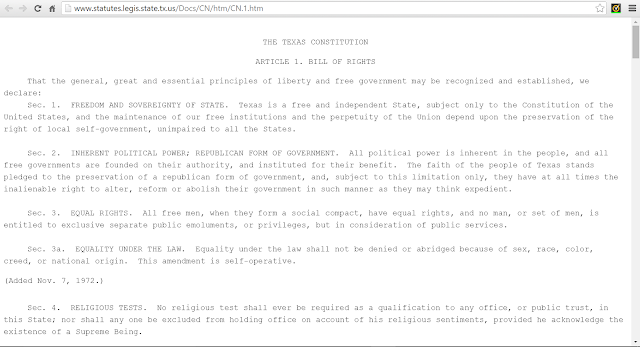 I was reading an article about Cristin Padgett, a fellow Atheist and member of the Democratic Party from Dallas, TX. It just so happened that stumbled upon some information about the Texas Constitution that I just could not believe. According to Article 1, Sec. 4. RELIGIOUS TESTS. No religious test shall ever be required as a qualification to any office, or public trust, in this State; nor shall any one be excluded from holding office on account of his religious sentiments, provided he acknowledge the existence of a Supreme Being.
I was reading an article about Cristin Padgett, a fellow Atheist and member of the Democratic Party from Dallas, TX. It just so happened that stumbled upon some information about the Texas Constitution that I just could not believe. According to Article 1, Sec. 4. RELIGIOUS TESTS. No religious test shall ever be required as a qualification to any office, or public trust, in this State; nor shall any one be excluded from holding office on account of his religious sentiments, provided he acknowledge the existence of a Supreme Being.
Christian privilege - is the system of advantages bestowed upon Christians in some societies. This system arises out of the presumption that the belief in Christianity is a social norm, leading to the exclusion of the nonreligious and members of other religions through institutional religious discrimination. Christian privilege can also lead to the neglect of outsiders' cultural heritage and religious practices.
Religious discrimination - is valuing or treating a person or group differently because of what they do or do not believe. Specifically, it is when adherents of different religions (or denominations) are treated unequally, either before the law or in institutional settings such as employment or housing.
Religious discrimination is related to religious persecution, the most extreme forms of which would include instances in which people have been executed for beliefs perceived to be heretic. Laws which only carry light punishments are described as mild forms of religious persecution or as religious discrimination.
Atheism - is the rejection of belief in the existence of deities.In a narrower sense, atheism is specifically the position that there are no deities.Most inclusively, atheism is the absence of belief that any deities exist. Atheism is contrasted with theism, which, in its most general form, is the belief that at least one deity exists.
Religious discrimination is related to religious persecution, the most extreme forms of which would include instances in which people have been executed for beliefs perceived to be heretic. Laws which only carry light punishments are described as mild forms of religious persecution or as religious discrimination.
Atheism - is the rejection of belief in the existence of deities.In a narrower sense, atheism is specifically the position that there are no deities.Most inclusively, atheism is the absence of belief that any deities exist. Atheism is contrasted with theism, which, in its most general form, is the belief that at least one deity exists.
Agnosticism - is the view that the truth values of certain claims – especially metaphysical and religious claims such as whether or not God, the divine or the supernatural exist – are unknown and perhaps unknowable.
I really had a hard time believing this and went to seek out the truth for myself, and it was really in the constitution! Then I flashed back to an earlier post in this series where I said "The truth is that I see religion as a means of social control and domination for those who are in control of governments and other institutions that are used to govern. It does not mean that do not respect a person's convictions or belief in a higher power, and in my acceptance, I am exposed to the constant barrage of God this and prayer that memes, comments and posts via social media. The problem comes when I decide to make a post in reference to my Atheism, someone tries to flex their privilege and respond with some chastisement about how THEIR God is the real deal, mind you, I don't comment on others' posts when it regards religion! I have constantly question whether or not I want to go to certain events because someone will try to guilt me into a prayer circle or saying grace at a dinner."
Faced with the idea that my plans for a possible run for office in Texas can be rejected because I don't believe in God is really outrageous. While there is no requirement to respect any religion in any way, shape or form, it is clear that those who fall on the spectrum of Atheist to Agnostic are not respected. In other words, Atheists and Agnostics need not apply. Just when I thought that Texas could be anymore ass backwards, we have reached new lows. This is now the time to challenge the constitutionality of the Texas Constitution.

No comments:
Post a Comment
Note: Only a member of this blog may post a comment.